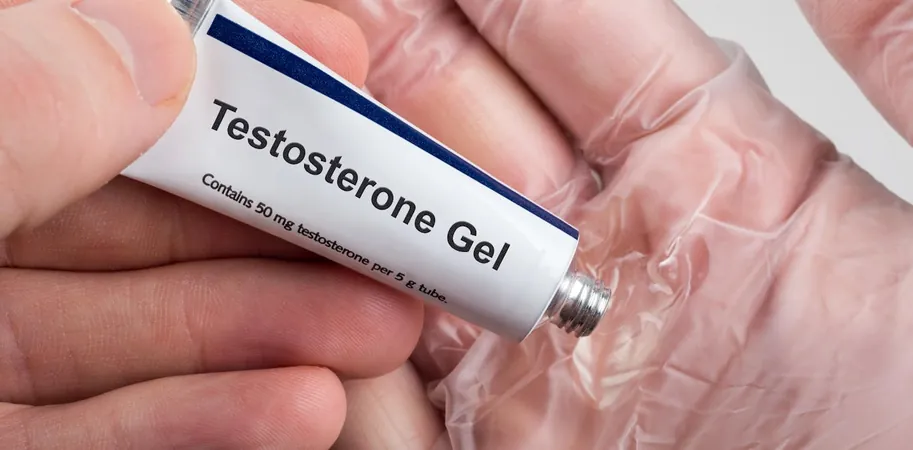
The Growing Trend of Testosterone Therapy Among Young Men: Benefits, Risks, and What You Need to Know
2024-11-18
Author: Ming
Introduction
In recent years, a surge of younger men has turned to testosterone replacement therapy (TRT) in hopes of boosting their testosterone (T) levels, enhancing mood, and increasing muscle mass. As social media and various online influencers advocate for this approach, it has sparked both interest and concern among health professionals.
Understanding Testosterone's Role
Testosterone plays a crucial role in male health, affecting everything from muscle mass and mood to cognitive functions, libido, and energy levels. While it might seem logical to supplement testosterone when levels fall, the reality is far more complex.
Research confirms that TRT can have significant benefits for men with verified testosterone deficiencies, particularly older adults. It has been associated with increased muscle mass, reduced body fat, enhanced sexual desire, and improved overall quality of life. However, crucial studies have mainly focused on older populations, leaving a gap in understanding TRT's implications for younger men.
Declining Testosterone Levels in Young Men
From the age of 30, testosterone levels naturally begin to decline, with some estimates suggesting a decrease of 1%-2% annually. This decline can be exacerbated by underlying health issues such as obesity, diabetes, and chronic inflammation. Interestingly, while low testosterone might be expected in older age, it’s not necessarily a universal fate. Many healthy men maintain normal testosterone levels well into their 70s and 80s.
For younger men, serious testosterone deficiency requiring medical intervention is relatively rare and is often linked to specific genetic syndromes like Klinefelter syndrome. Despite this rarity, there have been reports of a generational decline in testosterone levels, attributed to factors such as increased stress, unhealthy diets, lack of exercise, and rising obesity rates. Notably, environmental influences, including hormone-disruptive chemicals found in plastics and pesticides, may further impact testosterone levels.
Even with this decline, many young men still have testosterone levels classified within the "normal" range. Before resorting to TRT as a remedy for issues like fatigue, low mood, or decreased muscle mass, it is critical to examine lifestyle changes that could be more effective. Improvements in diet, stress management, exercise, and adequate sleep can significantly influence testosterone levels and overall well-being.
The Hidden Dangers of TRT
There has been historical concern that testosterone therapy might raise the risk of prostate cancer or heart attack, but emerging clinical trials have largely refuted this claim for older men. However, younger men, especially those under 30, have not been thoroughly studied in this context, leaving potential risks largely unknown.
One major concern with TRT is that testosterone levels can fluctuate due to various factors, such as stress, illness, or poor sleeping habits. A single measure of testosterone may not provide a complete picture, leading to unnecessary treatments if not accurately assessed. Over-supplementation can potentially elevate health risks, such as increasing red blood cell counts, which may lead to blood clots or high blood pressure—conditions that can result in severe medical emergencies like stroke or heart attack.
Additionally, excessively high testosterone levels can cause cardiac hypertrophy, a condition that thickens the heart muscle, raising the risk of cardiovascular problems over time. Young men may be particularly exposed since they are often not routinely screened for heart conditions.
TRT can also have implications for fertility as it may suppress natural testosterone production, affecting hormone signals essential for sperm production. While some men may regain fertility after therapy, in others, it could become a permanent issue.
Other cosmetic side effects include severe acne and accelerated hair loss, potentially impacting self-esteem and psychological health.
Conclusion
To conclude, before considering testosterone replacement therapy, younger men should consult healthcare providers to ascertain whether they truly have a deficiency and evaluate all associated risks alongside potential benefits. Making significant lifestyle changes may provide an initial, non-invasive approach to managing testosterone levels, while those who opt for TRT should ensure close monitoring to catch any side effects early on.





 Brasil (PT)
Brasil (PT)
 Canada (EN)
Canada (EN)
 Chile (ES)
Chile (ES)
 España (ES)
España (ES)
 France (FR)
France (FR)
 Hong Kong (EN)
Hong Kong (EN)
 Italia (IT)
Italia (IT)
 日本 (JA)
日本 (JA)
 Magyarország (HU)
Magyarország (HU)
 Norge (NO)
Norge (NO)
 Polska (PL)
Polska (PL)
 Schweiz (DE)
Schweiz (DE)
 Singapore (EN)
Singapore (EN)
 Sverige (SV)
Sverige (SV)
 Suomi (FI)
Suomi (FI)
 Türkiye (TR)
Türkiye (TR)